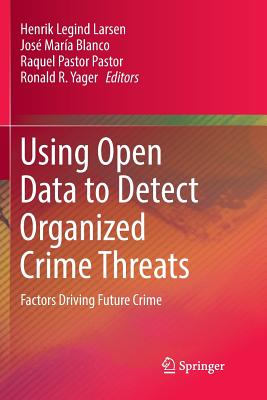Crime Solvability Factors: Police Resources and Crime Detection
暫譯: 犯罪可解決性因素:警力資源與犯罪偵查
Coupe, Richard Timothy, Ariel, Barak, Mueller-Johnson, Katrin
- 出版商: Springer
- 出版日期: 2019-09-11
- 售價: $7,200
- 貴賓價: 9.8 折 $7,056
- 語言: 英文
- 頁數: 493
- 裝訂: Hardcover - also called cloth, retail trade, or trade
- ISBN: 3030171590
- ISBN-13: 9783030171599
海外代購書籍(需單獨結帳)
相關主題
商品描述
At a time when resources are scarce, not every crime may be investigated as fully as is desirable. Police generally use experience to guide their case screening. This volume demonstrates a new, research-based approach, exploring innovative research on crime solvability as a factor for crime investigation and prevention.
Crime solvability is the interplay between forensic science, decision-making, and prediction to determine the likelihood that a crime will be solved. This text discusses recent studies of how solvable cases may be identified, using original sets of police data. It focuses on high-volume crimes such as burglary, assault, metal theft, and cyberfraud. By targeting more cases that can be solved, police departments can manage their resources better and have the greatest effect on arrests, as well as preventing future crimes by these offenders.Topics covered include:
- Research into the effects of crime solvability and detection outcomes.
- Studies ranging from less severe, high-volume crimes to severe offences.
- Resources on investigating and detecting crime.
- Theoretical resourcing-solvability model of crime detection.
- Detection complement preventive approaches in containing criminal activity.
- Chapters on incident solvability and measured use of resources in different investigative stages.
Crime Solvability Factors Police Resources and Crime Detection will be of interest to researchers in criminology and criminal justice, particularly with an interest in quantitative and experimental research and police studies. It will also be of interest to policymakers and police organizations.
商品描述(中文翻譯)
在資源稀缺的時期,並非每一宗犯罪都能如理想般得到充分調查。警方通常依賴經驗來指導案件篩選。本書展示了一種新的基於研究的方法,探討犯罪可解決性作為犯罪調查和預防的因素,並探索創新的研究。
犯罪可解決性是法醫科學、決策和預測之間的相互作用,用以確定一宗犯罪被解決的可能性。本書討論了如何識別可解決案件的最新研究,使用原始的警方數據集。重點放在高發生率的犯罪上,如入室盜竊、攻擊、金屬盜竊和網路詐騙。透過針對更多可解決的案件,警方部門可以更好地管理資源,對逮捕產生最大的影響,並防止這些罪犯未來再次犯罪。
涵蓋的主題包括:
- 研究犯罪可解決性和偵查結果的影響。
- 從較輕微的高發生率犯罪到嚴重罪行的研究。
- 調查和偵查犯罪的資源。
- 犯罪偵查的理論資源-可解決性模型。
- 偵查補充預防方法以遏制犯罪活動。
- 關於事件可解決性和在不同調查階段中資源使用的測量章節。
《犯罪可解決性因素 警方資源與犯罪偵查》將吸引犯罪學和刑事司法領域的研究者,特別是對定量和實驗研究及警方研究感興趣的人士。這本書也將引起政策制定者和警方組織的興趣。
作者簡介
Timothy Coupe researches and lectures criminal justice management, crime investigation and detection in the Institute of Criminology at Cambridge University. He previously worked in operational research, computing science, business management and urban and regional planning. He has been involved in applied research into improving policing performance for the U.K. Home Office and with police services in the U.K., Sweden, Denmark and Australia. He has consultancy experience in a variety of public organisations and commercial companies on the cost-effective use of resources and improving efficiency. He is an advocate of the benefits of using scientific analysis and prediction to complement professional experience for improving the way organisations are managed.
Barak Ariel is a lecturer in the Police Executive Programme. Among other topics, Barak provides seminars on research methods, systematic reviews and statistical analyses. As the chief analyst of the Jerry Lee Centre of Experimental Criminology, Barak is involved in several field experiments on police tactics in partnership with forces in the UK and abroad, including hotspot policing, restorative justice, use of cameras in police operations, informal crime control, and tax compliance. Barak is working in collaboration with Professor Lawrence Sherman and Dr. Heather Strang on Restorative Justice Trials, as well as in collaboration with Professor David Farrington on blocked randomised experiments. Barak is also working on a series of systematic reviews for the Campbell Collaboration, as well as other methodological issues related to experiments in Criminology.
Katrin Mueller-Johnson is a Senior Lecturer in Applied Criminology at the Institute of Criminology at the University of Cambridge.作者簡介(中文翻譯)
提摩太·庫普(Timothy Coupe)在劍橋大學犯罪學研究所研究並講授刑事司法管理、犯罪調查與偵查。他曾在運營研究、計算科學、商業管理以及城市與區域規劃等領域工作。他參與了針對英國內政部及英國、瑞典、丹麥和澳大利亞的警察服務的應用研究,旨在改善警務表現。他在多個公共機構和商業公司擔任顧問,專注於資源的成本效益使用和提高效率。他提倡利用科學分析和預測來補充專業經驗,以改善組織管理的方式。
巴拉克·阿里爾(Barak Ariel)是警察高層執行計劃的講師。除了其他主題外,巴拉克提供有關研究方法、系統性回顧和統計分析的研討會。作為傑瑞·李實驗犯罪學中心的首席分析師,巴拉克參與了多項與英國及國外警察部隊合作的現場實驗,涵蓋熱點警務、恢復性司法、警察行動中的攝像頭使用、非正式犯罪控制和稅務遵從等議題。巴拉克與勞倫斯·謝爾曼教授(Professor Lawrence Sherman)和希瑟·斯特朗博士(Dr. Heather Strang)合作進行恢復性司法試驗,並與大衛·法林頓教授(Professor David Farrington)合作進行區塊隨機實驗。巴拉克還在為坎貝爾合作組織(Campbell Collaboration)進行一系列系統性回顧,以及其他與犯罪學實驗相關的方法論問題。
卡特琳·穆勒-約翰遜(Katrin Mueller-Johnson)是劍橋大學犯罪學研究所的應用犯罪學高級講師。































